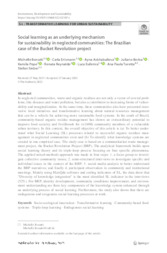Social learning as an underlying mechanism for sustainability in neglected communities: the Brazilian case of the Bucket Revolution project.
Social learning as an underlying mechanism for sustainability in neglected communities: the Brazilian case of the Bucket Revolution project.
Author(s): BONATTI, M.; ERISMANN, C.; ASKHABALIEVA, A.; BORBA, J.; POPE, K.; REYNALDO, R.; EUFEMIA, L.; TURETTA, A. P. D.; SIEBER, S.
Summary: In neglected communities, waste and organic residues are not only a vector of several problems, like diseases and water pollution, but also a contributor to increasing forms of vulnerability and marginalization. At the same time, these communities also have presented innovative local initiatives and transformative learning about natural resources management that can be a vehicle for achieving more sustainable food systems. In the south of Brazil, community-based organic residue management has shown an extraordinary potential to improve food security and livelihoods for (~1600) community members of a vulnerable urban territory. In this context, the overall objective of this article is (a) To better understand what Social Learning (SL) processes related to successful organic residues management in neglected communities exist and (b) To identify what knowledge systems are created in one empirical case. The study case is based on a communitarian waste management project, the Bucket Revolution Project (BRP). The analytical framework builds upon social learning theory and its triple-loop process focusing on four specific phenomena. The applied mixed-methods approach was made in four steps: 1. a focus group to investigate collective community issues; 2. semi-structured interviews to investigate specific and individual issues in the context of the BRP; 3. social media analysis to better understand the BRP narratives; and finally 4. participant observation in community and institutional meetings. Mainly using MaxQda software and coding indicators of SL, the data show that "Diversity of knowledge integration" is the most identified SL indicator in the interviews (52%). For BRP, identity development, community conditions improvement, and environment understanding are three key components of the knowledge system enhanced through an underlying process of social learning. Furthermore, the study also shows that there are endogenous and exogenous social learning processes at work.
Publication year: 2022
Types of publication: Journal article
Unit: Embrapa Soils
Observation
Some of Embrapa's publications are published as ePub files. To read them, use or download one of the following free software options to your computer or mobile device. Android: Google Play Books; IOS: iBooks; Windows and Linux: Calibre.
Access other publications
Access the Agricultural Research Database (BDPA) to consult Embrapa's full library collection and records.
Visit Embrapa Bookstore to purchase books and other publications sold by Embrapa.

